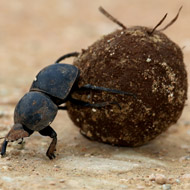
Insects could provide a natural method of worm control
Dung beetles can reduce the development and survival of parasites in cowpats, a study by the University of Bristol has found.
Published in the Journal of Applied Ecology, the study suggests that dung beetles dry out cow pats, leading to the death of parasites.
Given that current parasite controls are expensive and involve chemicals, scientists hope the discovery could lead to a cheaper, more natural way to keep cattle worm-free.
In the study, researchers made artificial cow pats using faeces from elsewhere and manipulated them by adding dung beetles and varying simulated rainfall.
Over the first six weeks, the numbers of parasitic larvae found on vegetation around the pats increased. This remained high for the rest of the experiment.
At first, the team found more parasites around pats colonised by dung beetles as opposed to un-colonised pats. But after eight weeks, they found fewer larvae around the colonised pats. This pattern also continued for the rest of the experiment.
The study found that increased rainfall led to more parasitic larvae in the pasture, suggesting that the survival of livestock parasites as a result of dung beetle activity can be overridden by heavy rainfall.
It was thought that dung beetle activity ventilates cow pats, providing the right initial conditions for parasite egg hatching.
However, the researchers found that parasite survival was reduced in pats with more beetles. Larvae need moist conditions, and dung beetle activity dries cow pats out, leading to parasite death.
Commenting on the study, lead researcher Bryony Sands said: “Dung beetle conservation is vital for the welfare of our farm animals.
"The conservation of dung beetles on farmland today is extremely important for their role in dung degradation, nutrient cycling, pasture fertility, and because now we have seen that they can contribute to reducing economically deleterious livestock parasites on farms.
"These beetles may be important in cow welfare, as cows are severely affected by parasites found in their intestines."
Current control against parasites involves insecticide chemicals which the cows do not fully digest, resulting in contaminated cow pats.
Bryony adds: ”These pats are toxic to dung beetles, even though these critters may provide natural control against the same parasites the chemicals are fighting. Controlling parasites is expensive, and these beetles could provide a natural way to keep cows worm-free.”
‘Dung beetles reduce livestock gastrointestinal parasite availability on pasture’ by B. Sands and R. Wall in Journal of Applied Ecology.



 The latest
The latest